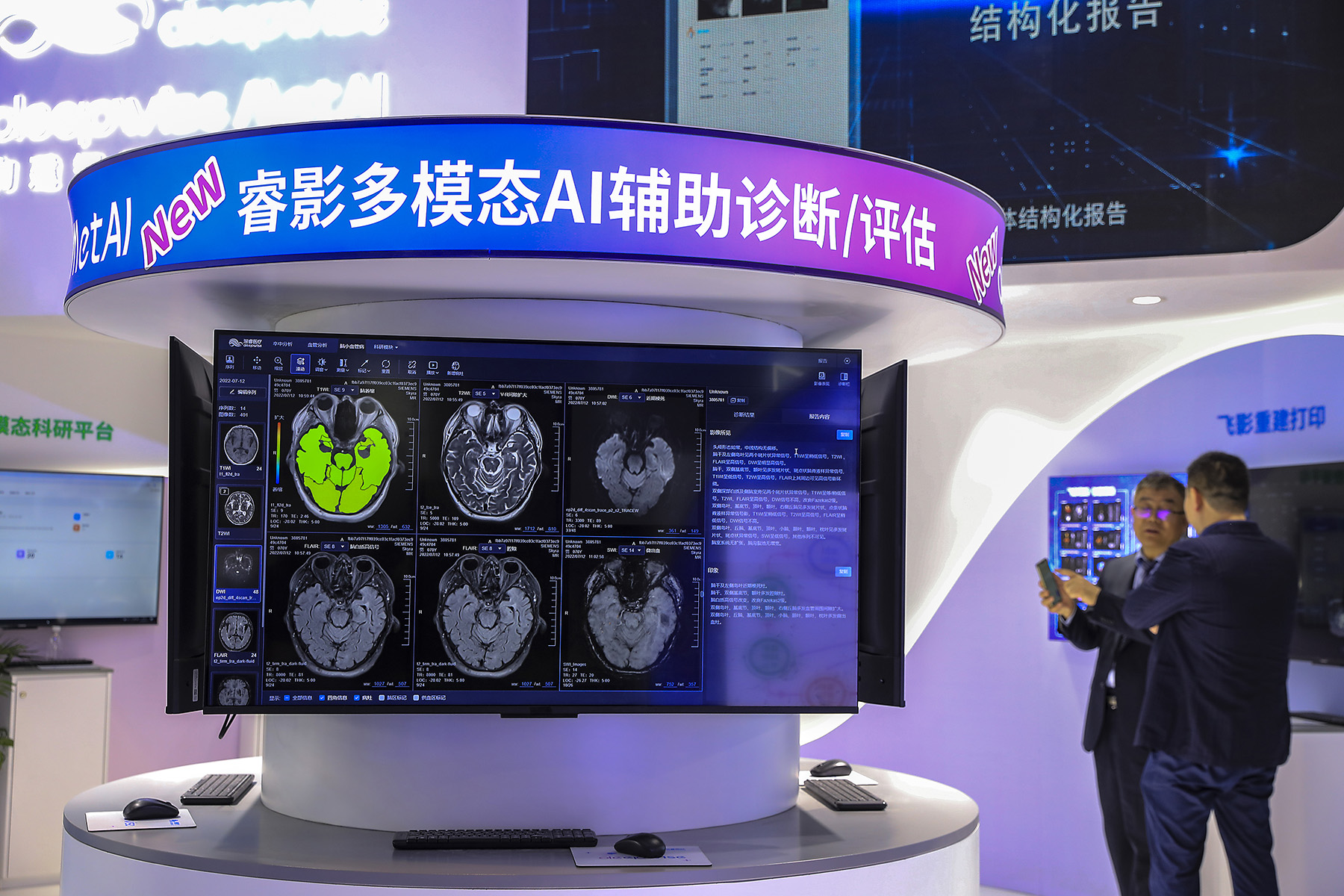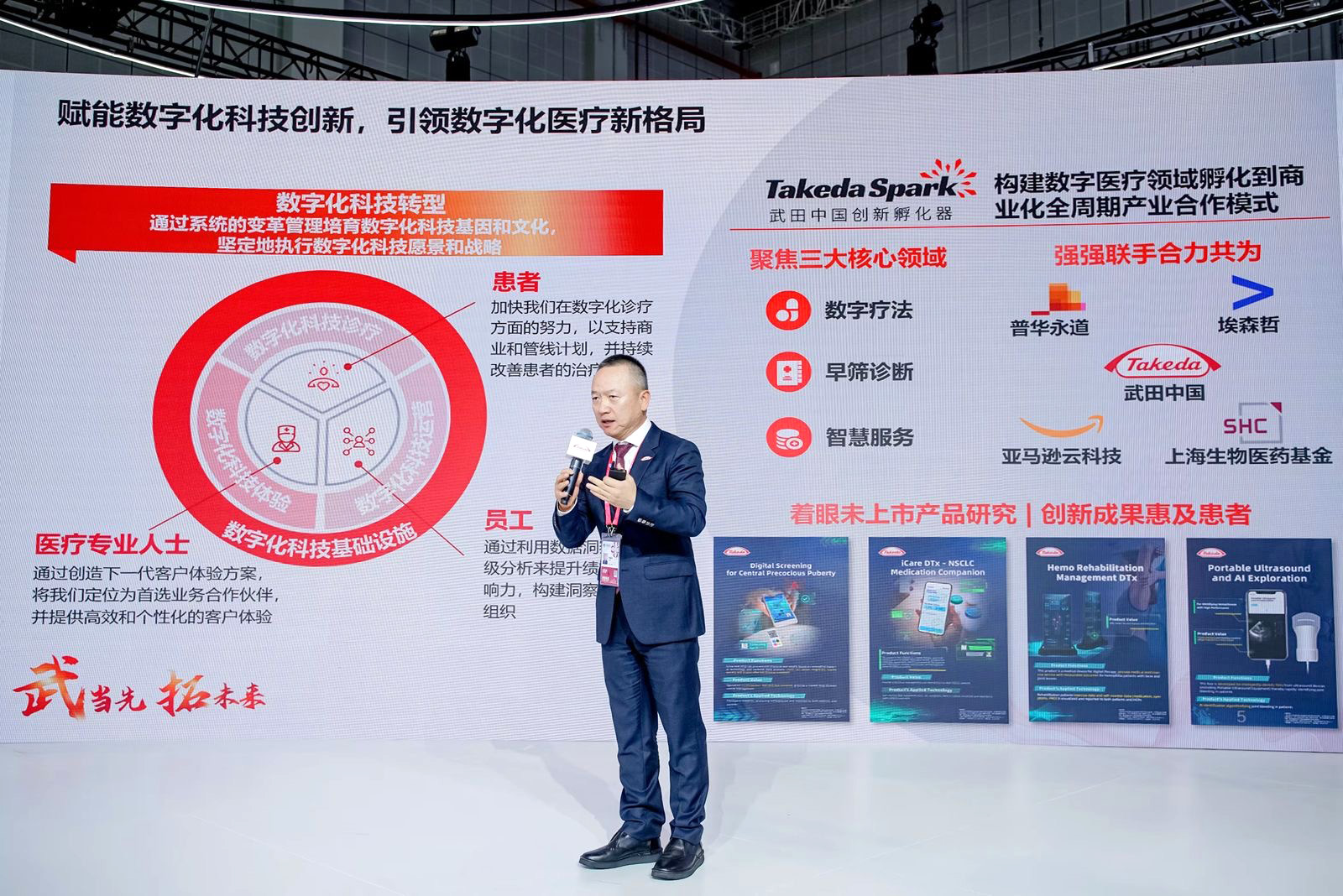Nvidia CEO expects 'amazing revolution' in digital biology

New quality productive forces, represented by artificial intelligence and other digital technologies, are shaping China's healthcare sector, likely cultivating the next paradigm shift, industry experts said.
Jensen Huang, co-founder, president and CEO of Nvidia, said that with the empowerment of digital technologies in the healthcare market, AI-accelerated pharmaceutical science may become the next big thing, and that the expected "amazing revolution" is going to take place in digital biology.
Huang said at an earlier news conference that over the past decade, biology has increasingly become an information science, with biological data expanding exponentially.
READ MORE: Premier Li: China to keep expanding market access
"Our ability to read, write and edit DNA is accelerating. Technologies like machine learning and cloud computing are unlocking new insights from mountains of biological data. As a result, the bio revolution is underway."
The latest report from research consultancy Global Market Insights showed that by 2032, the global AI-empowered healthcare sector will reach $70 billion, with a compound annual growth rate of over 29 percent between 2024 and 2032, while that in China is expected to be 30 percent.
China Merchants Securities said that this year, the global AI-empowered healthcare market is expected to top $5 billion, and remain at a high growth rate in the coming years. In terms of subcategories, drug discovery and medical imaging are the two areas taking up the most market share, adding up to over 50 percent.
Specifically, with the development of the pharmaceutical industry and the iteration of AI technology, the market size of AI-enabled drug research and development is expected to exceed $20.5 billion by 2032, said CMS.
Enterprises both at home and abroad are already taking action.
For example, in October, pharmaceutical giant Takeda collaborated with Fudan University in Shanghai to establish its Digital Innovation Academy in China. The academy aims to utilize the advantages of both Takeda and the university to facilitate development of patient-centric digital therapies and commercial transformation, gain research insights into the development of digital healthcare products and solutions, cultivate talent for China's digital healthcare industry and benefit the overall industry.
The academy also aims to combine efforts to develop innovative topic studies and conceptual models ranging from screening and diagnosis to treatment. AI solutions are also involved in the studies, said the company.
"New technologies, including AI, as well as other technologies, are completely transforming our industry as the way we do research and development, manufacturing, and the way we interact with a doctor and a patient," said Christophe Weber, CEO of Takeda.
"New technology will help build more efficient healthcare systems ... the way we do things will completely be transforming the next three years, offering a huge opportunity with significant transformation," he added.

Wang Hongwei, a professor at the School of Life Sciences and vice-president of Tsinghua University, said: "New quality productive forces, represented by AI and other digital technologies, are empowering China's healthcare sector. For example, AI helps accelerate the R&D process of new drugs, bringing big advancements, or even paradigm shifts, to the overall healthcare system."
Zhongtai Securities said that AI has wide applications in the medical imaging category, application scenarios are diversified and future development space is huge. By 2025, the global AI-enabled medical imaging sector is expected to reach 44.2 billion yuan ($6.1 billion), with a CAGR of 135 percent between 2023 and 2025.
"Judging from the demand side, China's medical resources are unevenly distributed. High-quality medical resources are excessively concentrated, and there is a supply-demand gap in senior physician talent. AI technology can help quickly identify problems, improve the efficiency and accuracy of diagnosis and treatment, and make up for the gap," said Zhang Xu, an academician at the Chinese Academy of Sciences, and also a member of the Chinese Academy of Medical Sciences.
"At the same time, through assisted diagnosis and treatment, grassroots medical institutions can be empowered to promote the allocation of high-quality medical resources from first-tier cities to smaller cities and grassroots-level regions," Zhang said.
AI is empowering not only screening and diagnosis, but also payment processes. In the past, when encountered with major illnesses, after spending a lot of money, patients usually needed to go to the healthcare insurer's counter and submit a series of materials to get reimbursement.
With the help of AI, patients can process claims and insurance paperwork much more smoothly. For example, when AI-enabled technology platforms are docked with huiminbao — a commercial healthcare insurance that supplements public healthcare insurance — patients no longer need to jump through hoops to process claims.
All things can be done online. AI-enabled optical character recognition realizes image sorting and recognition, guiding patients to upload materials needed for claims so as to avoid incorrect or repetitive submissions.
"AI's language and image processing capabilities can effectively increase work efficiency by as much as 50 percent. By matching claim rules under different scenarios, different policies and different customer groups, AI is able to process six claims per second, and issue claim reports within 8 seconds, with an accuracy of 99.8 percent. Moreover, AI helps to infer the risks of claim cases and gives corresponding suggestions, greatly cutting enterprises' operating costs," said the spokesperson of Shanghai-based MediTrust Health, a company that offered AI technology support to huiminbao.
With enterprises stepping up efforts to promote the application of advanced technologies in every facet of healthcare, there is still a huge gap between laboratory discovery and real-time applications.
ALSO READ: AI model helps diagnose ovarian cancer
"Speaking of AI, we physicians from the imaging department may be the ones that benefit the most. AI is able to replace our preliminary work, such as reading images in the first place and making primary assessments. However, we still need to read images and make diagnoses by ourselves," said a physician surnamed Qin, who works at Beijing Chaoyang Hospital, Capital Medical University.
Zheng Shanjie, head of the National Development and Reform Commission, the country's top economic regulator, said that China will take solid steps to accelerate the development of new quality productive forces, boost industrial innovation via technological innovation, speed up the upgrading of traditional industries and foster emerging industries.
Zheng said the NDRC will constantly carry out practical measures, especially in the sectors of life sciences, high-end manufacturing and digital technologies, to facilitate companies doing business in China.
"China has now entered a high-quality development stage, which requires us to upgrade production quality. On the one hand, we should constantly promote the development of new technologies, such as AI, by further enhancing our independent R&D capabilities, innovative capabilities as well as scientific discovery abilities. The quicker we act, the more opportunities we will have," Wang from Tsinghua University said.
"On the other hand, we should think carefully about how we can better apply new technologies to all walks of life so as to make good use of them to serve us humans better. For example, it is important to think about what changes will take place and how we should react when we apply AI to diagnosis and other medical services."


